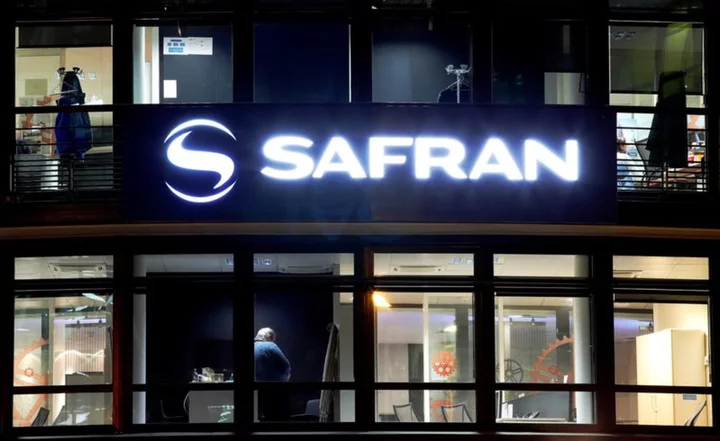By Tim Hepher
PARIS (Reuters) -France's Safran pinpointed continued pressure on supply chains, offset by strong demand for jet engine repairs, as it posted a 26% gain in underlying third-quarter revenue on Friday.
The engine and equipment maker said revenues rose 20.1% - or 25.9% on a like-for-like basis - to 5.82 billion euros ($6.14 billion), boosted by strong demand for aftermarket services.
Together with GE, Safran co-produces LEAP jet engines for all Boeing and some Airbus narrow-body jets through their CFM International joint venture.
Both this week trimmed a full-year percentage growth forecast for LEAP engine deliveries to 40-45% from around 50%. So far this year, deliveries have risen 45% to 1,174 units.
Safran, however, raised its percentage growth forecast for civil aftermarket sales to the low 30s from mid-to-high 20s, after the widely watched performance indicator grew 38% in dollar terms in the first nine months.
Shares rose 0.8% in early trading.
Disruptions in supply chains are slowing growth in new deliveries, while surging travel demand is pushing up fleet repairs, creating a tug of war for fresh engines between aircraft assembly plants and maintenance facilities.
Safran reaffirmed its financial targets.
CEO Olivier Andries said the most fragile parts of the supply chain remained raw materials, castings and forgings.
He also adopted a cautious stance ahead of negotiations with planemakers over engine supplies for 2025.
The issue is seen as particularly urgent for Airbus which aims to raise output sharply, but which has differed in the past with CFM over its often more cautious view on supply chains.
For 2025, Andries said CFM was ready to accommodate a return to levels of output reached, or planned, prior to the pandemic: equivalent to 50 narrow-body jets a month at Boeing and 65 at Airbus.
"Is that the final requirement that will ultimately be given by the planemakers? We'll see, but we are preparing for that."
The figures are roughly in line with plans announced by Boeing but below levels flagged to the industry by Airbus.
Andries' comments come against the backdrop of chronic supply problems at Pratt & Whitney, which competes with CFM to power the Airbus A320 series.
"With the situation at Pratt & Whitney he is in a strong position," a senior industry source said.
Airbus had no immediate comment.
In public, Airbus recently dropped an interim target of 65 A320 jets a month by the end of 2024, up from just over 50 now, and is focusing instead on a longer-range target of 75 in 2026.
But industry sources say it has been encouraging suppliers to start 2025 on at least 65 a month, rising towards a level not far from 75 a month by the end of that year.
At Boeing, Chief Executive Dave Calhoun said this week it planned to reach 50 a month "in the 2025/2026 time frame".
($1 = 0.9473 euros)
(Reporting by Tim Hepher, editing by Tassilo Hummel and Sharon Singleton)

